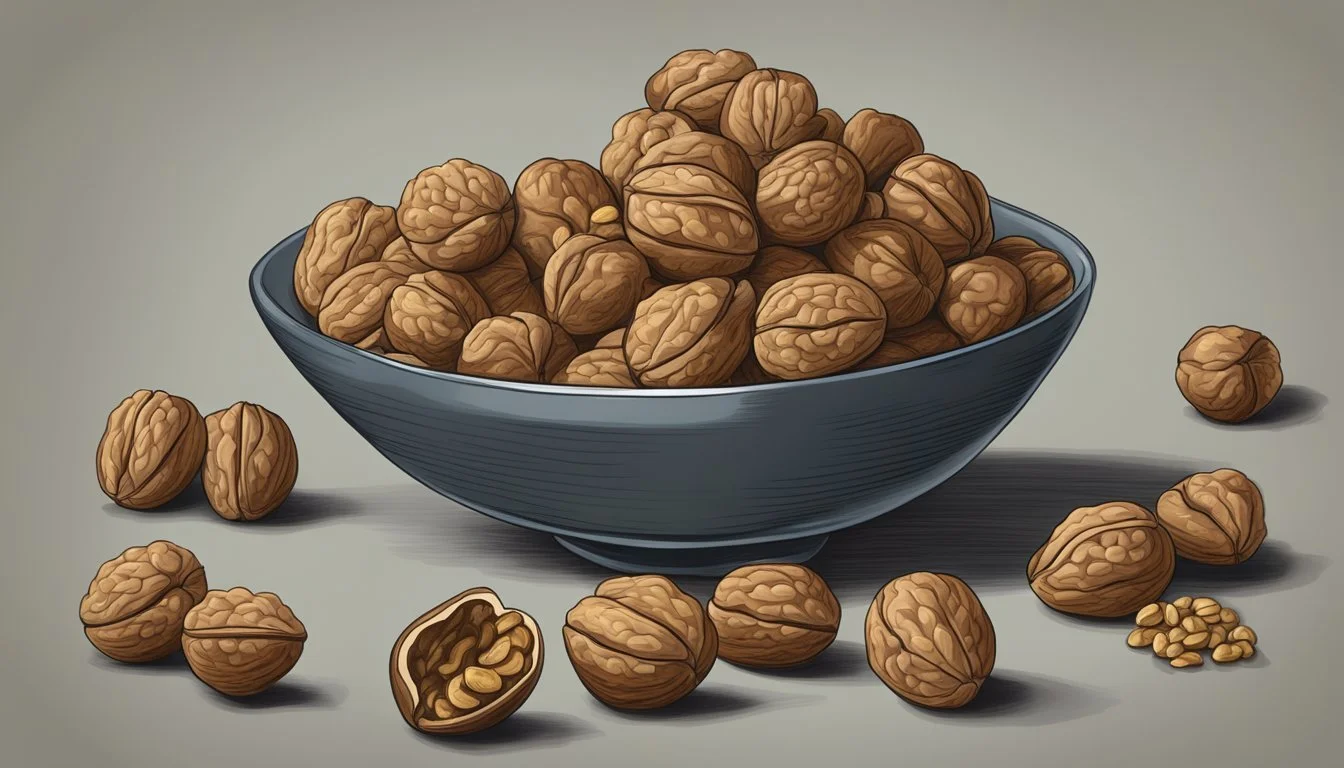Anti-Inflammatory Foods to Relieve Knee Pain Naturally
Knee pain can be a significant hindrance to daily activities and overall quality of life. While there are various treatments available, the power of nutrition in alleviating knee pain is often overlooked. Incorporating certain foods into your diet can provide relief and improve joint health by reducing inflammation and providing essential nutrients.
Diet plays a critical role in managing joint pain, particularly for individuals suffering from conditions such as osteoarthritis. By choosing the right foods, it is possible to support joint function, decrease discomfort, and potentially slow the progression of pain-related issues.
1) Turmeric
Turmeric is a spice frequently used in South Asian cuisine. It contains curcumin, a compound known for its anti-inflammatory and antioxidant properties. These properties can help reduce knee pain associated with arthritis.
Studies indicate that taking daily turmeric supplements can alleviate discomfort in individuals with knee osteoarthritis. This makes turmeric a potential natural alternative to traditional pain relief medications.
Turmeric's benefits aren't limited to just reducing pain. Curcumin, its active ingredient, may also improve joint function and reduce the stiffness that often accompanies osteoarthritis. This can lead to better mobility for those affected.
Despite its benefits, it's important to note that turmeric should be taken in appropriate doses. High doses can cause digestive issues or interact with certain medications. Consulting a healthcare provider before starting turmeric supplements is recommended.
For those looking to naturally manage knee pain, adding turmeric to their diet might offer a range of benefits. Whether through supplements or dietary inclusion, this spice provides a promising option for better joint health.
2) Ginger
Ginger has been recognized for its medicinal properties for centuries, especially in Eastern cultures. It contains potent anti-inflammatory compounds like gingerols, which may help reduce pain and stiffness in the knees.
Some research indicates that ginger can alleviate symptoms of osteoarthritis and rheumatoid arthritis. Consuming ginger in the form of tea, capsules, or fresh slices can be beneficial.
Topical applications of ginger, such as ginger cream, can also be useful. Rubbing such products on the knee may offer relief by reducing inflammation and pain.
It's important to ensure that one doesn't have a ginger allergy before increasing its intake. Always consult a healthcare provider for personalized advice.
3) Olive Oil
Olive oil, particularly extra virgin olive oil (EVOO), is known for its potential benefits in alleviating knee pain. It contains antioxidants and healthy fats that combat inflammation, a major contributor to joint discomfort. The polyphenols in EVOO have been studied for their effectiveness in reducing inflammation in arthritis.
Incorporating olive oil into the diet can support joint health. Drizzling it over salads or using it in cooking are simple ways to add this beneficial oil. The omega-3 fats found in EVOO also contribute to its anti-inflammatory properties, making it a valuable addition to meals.
Research has shown that EVOO may help improve symptoms in individuals with rheumatoid arthritis and other inflammatory autoimmune diseases. Regular consumption of olive oil can thus play a supportive role in managing knee pain caused by such conditions.
4) Salmon
Salmon is a rich source of omega-3 fatty acids, which are well-known for their anti-inflammatory properties. These fatty acids help reduce inflammation in the body, potentially alleviating knee pain caused by osteoarthritis and other joint conditions.
Omega-3 fatty acids found in salmon include EPA and DHA. These components help protect the knee joint by reducing enzymes that degrade cartilage. Consuming salmon regularly can support overall joint health.
In addition to omega-3s, salmon is packed with other beneficial nutrients. It contains high-quality protein, essential for maintaining muscle mass around the joints, and vitamin D, which plays a crucial role in bone health.
Including salmon in the diet can be an effective way to manage knee pain naturally. Eating two to three servings per week can provide substantial benefits. Cooking methods such as grilling, baking, and steaming can preserve the nutritional value.
Salmon can be incorporated into a variety of dishes, making it an accessible option for many diets. Its nutrient profile supports joint health, making it a valuable addition to a knee-friendly diet.
5) Berries
Berries like strawberries, blueberries, and blackberries are fantastic for managing knee pain. These fruits are rich in antioxidants, which can reduce inflammation. Inflammation is a key contributor to knee pain, especially in conditions like osteoarthritis.
Adding a couple of handfuls of berries to the daily diet can help mitigate discomfort. Studies have shown that regular consumption of berries can significantly decrease pain levels over time.
Berries also contain vitamins and minerals that support joint health. Their high vitamin C content helps in collagen formation, which is vital for maintaining cartilage. Including a variety of berries in meals or snacks offers a tasty way to support knee health.
Research supports the benefits of berries for those suffering from arthritis. Participants in studies noted a decrease in constant and intermittent pain after consistent berry consumption for several weeks. Simple dietary changes like this can make a meaningful impact.
Overall, incorporating berries into daily nutrition is an effective and natural approach to easing knee pain. They are a delicious and easy addition to improve one's diet and support overall joint health.
6) Broccoli
Broccoli is a nutrient-packed vegetable that can benefit individuals experiencing knee pain. It contains high levels of vitamins K and C, which are essential for bone health and reducing inflammation.
Research shows that broccoli also contains sulforaphane. This natural compound has properties that may block the inflammation process and slow down cartilage damage in osteoarthritis.
Including broccoli in the diet may help in managing knee pain due to its anti-inflammatory and bone-strengthening components. This vegetable can be enjoyed steamed, raw, or added to various dishes to enhance nutritional intake.
7) Walnuts
Walnuts are a nutritional powerhouse that can help alleviate knee pain. They are rich in omega-3 fatty acids, which possess anti-inflammatory properties. These fatty acids may reduce inflammation in the joints, providing relief to those suffering from knee pain.
In addition to omega-3s, walnuts contain antioxidants such as vitamin E and polyphenols. These compounds help combat oxidative stress, which can damage joint tissues over time. Including walnuts in your diet can therefore support joint health.
Walnuts are easy to incorporate into various meals. You can add a handful to salads, mix them into yogurt, or simply eat them as a snack. Their versatility makes them a convenient food choice for improving joint health.
Lastly, walnuts are also a good source of magnesium, another mineral important for bone health. Adequate magnesium intake can support the maintenance and function of healthy joints, contributing to reduced knee pain.
Overall, walnuts provide multiple nutrients that work together to support joint health and reduce pain.
8) Green Tea
Green tea is known for its anti-inflammatory properties. It contains compounds like polyphenols and antioxidants that can help reduce joint pain and inflammation. For those suffering from knee pain, incorporating green tea into their daily routine could offer some relief.
Studies have shown that green tea may improve joint function. The antioxidants in green tea can protect against cartilage damage, potentially slowing the progression of arthritis. The active ingredient, epigallocatechin-3-gallate (EGCG), is particularly beneficial.
Drinking green tea can also assist with weight management. Maintaining a healthy weight reduces stress on the knees, which can further alleviate pain and prevent future joint problems. This makes green tea a simple addition to a knee-friendly diet.
It's important not to overconsume green tea. Excessive intake may lead to side effects like insomnia or digestive issues due to caffeine content. A moderate amount, such as 1-2 cups a day, is recommended to reap its benefits without adverse effects.
Green tea can be enjoyed hot or cold. It can be brewed and served plain or with a touch of honey for added flavor. Including green tea as part of an overall healthy diet is an easy and effective way to support knee health.
9) Chia Seeds
Chia seeds are renowned for their rich nutritional profile, particularly their high content of alpha-linolenic acid (ALA). ALA is a type of omega-3 fatty acid known for its anti-inflammatory properties.
This anti-inflammatory effect can be beneficial for those experiencing knee pain, as it helps reduce swelling and discomfort in the joints.
In addition to omega-3 fatty acids, chia seeds are a good source of fiber. High fiber intake can aid in maintaining a healthy weight, which is crucial for reducing pressure on knee joints.
Moreover, chia seeds contain essential minerals such as magnesium and phosphorus, which support bone health. Stronger bones can contribute to better joint function and less pain.
Adding chia seeds to a diet is simple. They can be sprinkled over salads, mixed into smoothies, or incorporated into baked goods.
Their versatility and mild flavor make them an easy addition to various meals, enhancing both nutritional value and joint health.
Regular consumption of chia seeds can be a helpful strategy in managing knee pain through natural dietary choices.
10) Flaxseeds
Flaxseeds are small but packed with nutrients that can help alleviate knee pain. They are notably rich in alpha-linolenic acid (ALA), a type of omega-3 fatty acid known for its anti-inflammatory properties. Incorporating flaxseeds into the diet may help reduce inflammation, which can ease discomfort in the knees.
Studies suggest that the essential fatty acids in flaxseeds may protect against diseases like rheumatoid arthritis, which affects the joints. These fatty acids help in reducing the production of pro-inflammatory compounds in the body. Regular consumption of flaxseeds could thus contribute to better joint health.
Flaxseeds can be eaten whole or ground and easily added to many dishes. Adding a tablespoon of ground flaxseeds to breakfast cereals, smoothies, or yogurt can be a simple way to include them in the diet. Grinding flaxseeds is recommended to ensure better absorption of the nutrients.
Besides ALA, flaxseeds also contain lignans and fiber. Lignans exhibit antioxidant properties, which may further support joint health. The fiber content helps in digestion and can contribute to overall well-being, indirectly supporting joint health.
Nutritional Components That Aid Knee Pain
Different foods can help alleviate knee pain by reducing inflammation, providing key nutrients, and offering antioxidant properties essential for joint health.
Anti-Inflammatory Foods
Foods that help reduce inflammation can play a crucial role in managing knee pain. Cruciferous vegetables like broccoli and Brussels sprouts are excellent options. They contain sulforaphane, which helps block enzymes responsible for joint destruction. Turmeric and ginger are also potent anti-inflammatory agents. Their active components, curcumin and gingerol respectively, have shown promise in numerous studies. Including these spices in daily meals can have a significant positive impact on knee health.
Foods Rich in Omega-3 Fatty Acids
Omega-3 fatty acids are vital for reducing inflammation and promoting joint health. Fatty fish such as salmon, trout, and sardines are excellent sources. Consuming two 3-ounce servings of these fish each week can provide beneficial amounts of omega-3s. Flaxseeds, chia seeds, and walnuts are also rich in these fatty acids. Additionally, fish oil supplements are another effective option for those who do not consume fish regularly.
Antioxidant-Rich Foods
Antioxidants help protect the body by neutralizing free radicals, which can cause joint damage. Berries, such as blueberries, strawberries, and raspberries, are packed with antioxidants like vitamin C and anthocyanins. Green tea also contains powerful antioxidants called catechins that contribute to joint health. Whole grains like brown rice and quinoa offer essential nutrients, including phosphorus and selenium, which strengthen bones and reduce pain. Integrating these foods into a balanced diet can assist in managing knee pain more effectively.
Foods to Avoid for Knee Pain
Certain foods can exacerbate knee pain by promoting inflammation and putting stress on joints. Avoiding these foods can help manage pain and improve knee health.
Processed Foods
Processed foods often contain high levels of unhealthy fats, preservatives, and additives. These substances can cause inflammation and contribute to joint pain.
Examples of processed foods include packaged snacks, frozen meals, and fast food. These items typically have high sodium and sugar content.
Avoiding these foods can help reduce joint inflammation. Opt for whole foods like fresh vegetables, lean meats, and whole grains instead. These alternatives provide essential nutrients without inflammatory ingredients.
Sugary Drinks and Snacks
Sugary drinks and snacks are another category of foods that can aggravate knee pain. These items lead to weight gain, which increases strain on the knees. Excess sugar can also trigger inflammation.
Common sugary drinks include soda, fruit juice, and sweetened teas. Sugary snacks such as candies, pastries, and cookies should also be limited.
Reducing intake of these sugary items can help manage weight and reduce knee pain. Choose natural alternatives like water, herbal teas, fruits, and nuts for healthier options.
High-Sodium Foods
High-sodium foods, such as certain processed foods and condiments, contribute to water retention and increase joint swelling. This exacerbates knee pain and discomfort.
Canned soups, processed meats, and certain cheeses are often high in sodium. It's important to read labels and be aware of sodium content in foods.
Switching to low-sodium options and using herbs and spices for flavor can help manage knee pain. Fresh, home-cooked meals without added salt are also beneficial.
By avoiding these types of foods, individuals can help reduce inflammation and alleviate knee pain.
Dietary Tips for Managing Knee Pain
Incorporating certain dietary practices can help manage knee pain more effectively. Focus on balanced nutrition, staying hydrated, and proper meal planning to significantly improve joint health and reduce discomfort.
Balanced Diet Recommendations
A balanced diet rich in anti-inflammatory foods can ease knee pain. Fatty fish like salmon and trout provide essential omega-3 fatty acids, which help reduce inflammation. Cruciferous vegetables like broccoli and Brussels sprouts contain antioxidants beneficial for joint health.
Foods to include:
Fatty Fish: Salmon, trout, mackerel
Vegetables: Spinach, broccoli, kale
Fruits: Berries, oranges, apples
Limiting processed foods and sugars can also prevent inflammation. Opt for whole grains and lean proteins to maintain a healthy weight, reducing stress on your knees.
Importance of Hydration
Adequate hydration is crucial for maintaining joint lubrication and preventing stiffness. Water is essential for the formation of synovial fluid, which cushions and protects the knee joints.
Hydration tips:
Drink at least 8 glasses of water daily
Incorporate hydrating foods like cucumbers and watermelon
Limit caffeine and alcohol intake as they can dehydrate the body
Staying hydrated also supports nutrient transportation to the joints and helps in waste removal, ensuring your knee joints remain healthy.
Meal Planning and Preparation
Proper meal planning ensures a consistent intake of joint-friendly nutrients. Start by creating a weekly menu that includes a variety of foods from all essential groups. Include recipes that feature omega-3-rich fish, plenty of vegetables, and fruits high in vitamins C and D.
Sample meal plan:
Breakfast: Greek yogurt with berries and a sprinkle of flaxseeds
Lunch: Quinoa salad with spinach, cherry tomatoes, and grilled salmon
Dinner: Baked chicken with sweet potatoes and steamed broccoli
Prep meals in advance to avoid last-minute unhealthy choices. Use diverse cooking methods like grilling, steaming, or baking to retain the nutritional value of your meals.
By following these dietary tips, individuals can tackle knee pain more effectively and lead a more comfortable, active lifestyle.









